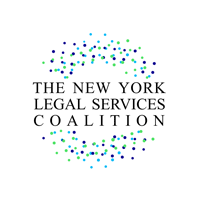Round up: Salary, Infrastructure key to closing New York’s Access to Justice Gap, Court Hears
FOR IMMEDIATE RELEASE
Earlier this week, the Chief Judge of the Court of Appeals and the State of New York, Hon. Rowan D. Wilson, held a statewide public hearing to evaluate the continuing unmet civil legal services needs in New York and to assess the level of resources necessary to meet those needs.
From the notice, the goal of the hearing was to examine “the impact of Judiciary Civil Legal Services (JCLS) funding on the delivery of civil legal services and the fair and efficient administration of justice in the State courts, [and] The current scope of unmet need for civil legal services by low-income New Yorkers confronting legal problems involving the essentials of life, and the funding necessary to provide the spectrum of effective assistance to meet those needs.”
Several members of the New York Civil Legal Services Coalition (NYLSC) testified and submitted testimony, all echoing the need to increase salaries and support infrastructure in the civil legal services as a key first step in closing New York’s access to justice gap.
Excerpt from the NYLSC written testimony:
“Legal services organizations cannot compete in the present market for legal talent. The Coalition’s member organizations are experiencing alarmingly high attrition rates and difficulty hiring due to lack of adequate funding to compete with government-funded comparable legal positions. This directly undermines the shared goal of our organizations and New York State to close the justice gap.”
Kristin Brown, president and CEO of Empire Justice Center and president of NYLSC, covered the challenges recruiting and retaining staff, including three surveys that illustrated the reasons behind the challenges. She shared:
“Most civil legal aid organizations are 75 to 100 percent government-funded, making the sector essential partners in the provision of government services. However, civil legal services organizations are at a distinct disadvantage in recruiting and retaining staff, particularly attorneys, because we are competing with other public sector and public interest jobs that pay significantly more for substantially similar work. In fact, civil legal services organizations often act as a pipeline – some might say a training source – for government agencies. Some providers report that 100% of attorneys who resign leave for government jobs. At Empire Justice Center within a one-month period this summer, three of our long-term attorneys resigned to take jobs as Administrative Law Judges at a state agency. All three expressed appreciation for their experience working at Empire Justice Center, but economics – significantly higher pay and a state pension – drove their decisions. Another upstate provider reported having recently lost seven attorneys within 6 months to government agencies.”
Adriene Holder, Chief Attorney of the Civil Practice at The Legal Aid Society, shared:
"Civil legal services providers are grappling with unprecedented staff attrition, a challenge that mirrors the broader ‘Great Resignation’ that has been affecting both public and private sectors nationwide. Efforts to recruit and retain staff have been hampered by low salaries, which are significantly lower than those in comparable government positions. To address these challenges, funding must increase not only to hire more staff but also to offer competitive compensation, including retirement benefits packages as well as access to public interest loan forgiveness, that will allow organizations to attract and retain experienced attorneys and ensure stable, consistent representation to those in need."
Jessica A. Rose, Esq., Executive Director, Brooklyn Legal Services Corporation A, and Co-Chair of the Legislative Advocacy Steering Committee of the NYLSC:
“The demand for civil legal services continues to grow, and increased funding is essential to provide continued support for eviction and foreclosure prevention work. The 2023 Annual Report from the Permanent Commission on Access to Justice estimated, New York State is short as much as $1 billion needed in additional funding to assist all low-income New Yorkers facing civil legal issues. Brooklyn A joins our fellow legal service providers in urging the state and city to maintain and expand its sources of funding for the Right to Counsel (RTC) and other programs to better meet the need to preserve affordable housing and prevent homelessness… The majority of our state and city contracts are not structured to cover yearly increased costs including cost of living adjustments (COLA) and this needs to be remedied so that the contracts include annual COLA increases as well as additional funding upfront to make up for the years without any such increases. Fully funding civil legal service programs and addressing contracting challenges are parts of the solution to the housing affordability crisis plaguing NYC and the state.”
Full written testimonies:
Brooklyn Legal Services Corporation A
Center for Elder Law & Justice
Volunteer Lawyers Project of CNY, Inc.
About the NYLSC
The New York Legal Services Coalition is a statewide association that represents the interests of civil legal services organizations and the communities they serve. Our members collectively provide services in the areas of family law, housing, immigration, and public benefits across all 62 counties of New York State.
-30-
